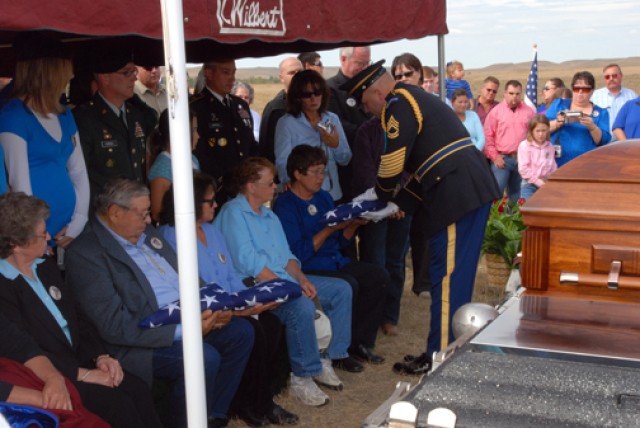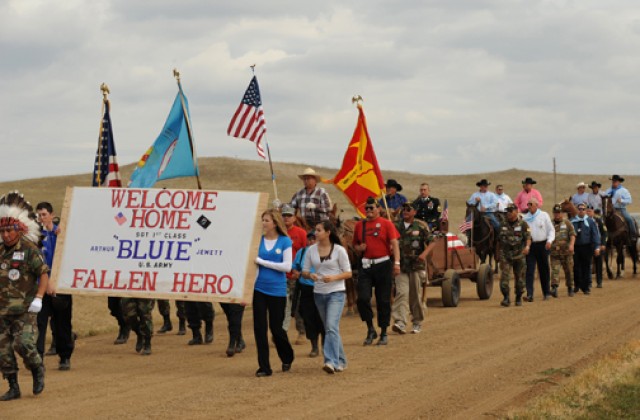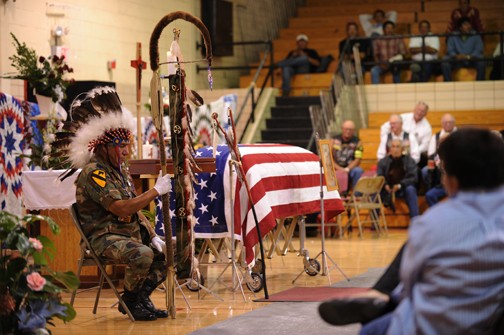RAPID CITY, S.D. (Army News Service, Sept. 30, 2009) -- A slow, rumbling drumbeat echoed across the hillsides of the Cheyenne River Indian Reservation last weekend as drummers led a somber procession down a gravel road toward a small, prairie cemetery near the banks of Jewett Creek.
At the center of this march was a polished, wooden casket resting quietly on a horse-drawn wagon. It carried the remains of Sgt. 1st Class Arthur F. "Bluie" Jewett, a member of the Cheyenne River Indian Tribe declared missing-in-action after the 1950 Chosin Reservoir campaign in Korea.
DNA testing had recently identified remains found in Korea as those of the NCO from the 7th Infantry Division and 59 years of uncertainty for the Jewett family ended.
On Aug. 25, a casualty assistance officer and a mortuary affairs specialist arrived in White Horse, S.D., to meet the Jewett family and to start preparations to bring their long-lost brother home.
Arthur's remains would be flown from Hawaii to South Dakota on a military aircraft, escorted the whole time by a member of the U.S. Army, to be buried with full military honors by the country he gave his life defending.
Full military honors
On the Sunday of Jewett's burial, an American flag covered his casket, and several like it could be seen in the hands of the many family, friends and tribal honor guard members who walked near the wagon as they escorted the fallen Soldier's remains to their final resting place.
The wagon driver stopped outside the front gates of the cemetery, and a senior noncommissioned officer in an Army dress blue uniform stepped down onto the ground.
As the pallbearers prepared to carry the casket through the gates, the NCO moved to his position near the entrance and stood at attention. It had been his solemn duty to escort the remains from Hawaii, and he saluted as they were carried past him toward a waiting burial plot.
Inside the cemetery, members of the South Dakota Military Funeral Honors team were ready to carry out their duty to this fallen veteran by conducting a full military burial.
The service included a color guard, rifle volley, the playing of taps by a lone bugle, and the folding and presentation of the American flag to the surviving family members, who had been waiting 59 years for this day to come.
The Jewett family was finally able to say goodbye to their loved one by laying him to rest near the ranch where he was born.
'Bluie' from birth
Jewett was born on Aug. 26, 1928, on a ranch east of White Horse, S.D. The fourth of 10 children, Arthur was just minutes older than his twin brother, Albert, and quickly acquired the nickname that he would carry throughout his life.
"They wrapped him in a blue blanket," said Louis Jewett, Arthur's older brother, about his birth. "A few minutes later the other one was born, so they wrapped him in a pink blanket. Nobody knew them as Arthur and Albert, it was always 'Bluie' and 'Pinky'."
Like the rest of his siblings, Arthur grew up working on his family's ranch and riding horses bareback across the prairie hills around their home, said Louis.
After graduating from high school, Jewett enlisted in the U.S. Army in 1948 at the age of 19. He was stationed in San Francisco, Calif., and Japan before being sent to Korea as a member of Company B, 1st Battalion, 32nd Infantry Regiment under the 7th Infantry Division.
Chosin Reservoir
The last letter Jewett's family members received from Bluie was dated in late November, 1950, while his unit was moving north, up the Korean peninsula. In it he talked about his plans for Thanksgiving.
"He made the comment 'We'll be eating our turkey on the run'," said Sgt. 1st Class Thomas H. Forbes, the casualty assistance officer assigned to the Jewett family by the South Dakota Army National Guard. "The battle of the Chosin being what it was, with the battle lines changing constantly, (Jewett's) platoon ended up being wiped out."
The Chosin Reservoir Campaign began on Nov. 27, 1950, when a force of roughly 60,000 Chinese attacked and surrounded 30,000 U.S. Soldiers and Marines at the Chosin Reservoir, in the mountains of northeastern North Korea. The battle continued for 17 days, through snow and sub-zero temperatures, as the U.S. forces attempted to break out of the Chinese encirclement.
On Jan. 13, 1951, almost six weeks after the Jewett family received Bluie's last letter, the county sheriff delivered a government telegram to his parents at their ranch, telling them that their son was M.I.A., said Louis.
"It was just a shock," he said. "They just could not believe it. My dad went up on a hill behind the house, gave out a yell and cried. The saddest moment of my life was hearing my dad cry."
Years of uncertainty
Jewett's body was never recovered after the battle, and it was only later that the Army changed his status from Missing-In-Action to Killed-In-Action, using the date of Dec. 2, 1950, said Forbes.
Louis said the uncertainty of Jewett's status, and the confusion surrounding the circumstances of his death haunted his family from then on. He said that until her death many years later, his mother, Keva, developed a habit of peeking out the window of the ranch toward the road, and his grandmother, Julia, would pray with her rosary every night before bed, hoping that Bluie was all right, and would soon return.
Though Jewett's death was a hard blow to overcome, it also served as a glue, holding the family together through the years, with stories of his life passed down to his nieces and nephews and their children.
"Our family has stayed intact," said Julie Marshall, Arthur's oldest surviving sister, who was 10 years old at the time of her brother's death. "Every one of us has thought, everyday in our lives, 'Are we going to find him'' 'Is he going to come home'' We didn't say it out loud, but we were all thinking about it."
These lingering thoughts continued through the year 2000, when tentative steps were taken in an attempt to bring closure to Jewett's family. A class of elementary students and their teacher from Spearfish, S.D., took it upon themselves to research South Dakota service members who were listed as M.I.A.
"They contacted my dad and asked if he could tell them more about his brother, Arthur," said Jennifer Schoelerman, Bluie's niece and daughter to his younger brother, Keith. "They began talking about how (the U.S. government) uses DNA testing. At that point it was just this big dream in the future."
With the information gained from talking to the student's teacher, Keith contacted the U.S. government, asking to be placed on their lists for possible DNA testing should any remains be found, Schoelerman said.
Remains recovered
In 2002, unbeknownst to the Jewett family, North Korea allowed a team from the United States into their country to recover remains of servicemembers who were lost during the Korean War, said Forbes. Once there, the team was led to a site where they discovered the remains of seven people, five of which were Americans. These were taken to Hawaii, where anthropologists and archeologists went to work in an attempt to discover their identities, he said.
Schoelerman said that it was 2005 when the government tried to get in contact with her father, hoping he could submit a DNA sample to compare with that of the remains found three years earlier. By this time her father Keith had been diagnosed with Lukemia, was very ill and was unable to be reached, she said. So they contacted her uncle Louis.
Louis gave his DNA sample in January 2006, as did his sister, Iyonne, and after three more long years, the results had finally come in.
Arthur 'Bluie' Jewett had finally been found.
Shock and relief
On Aug. 25, Forbes and Rena Thompson, a mortuary affairs specialist from the Department of the Army's Headquarters for Mortuary Affairs, the agency who had found and identified the remains, arrived in White Horse to meet the Jewett family.
For the Jewett family, the news was met with a combination of shock and relief, said Schoelerman, but there was also a great deal of sorrow for those who were no longer alive to hear it.
In the 59 years that had passed since 1950, Arthur Jewett was joined in death by his grandparents, parents and six of his brothers and sisters, including Keith, Iyonne and his twin brother Albert. Only his brother Louis and younger sisters Julie and Juanita remained.
"When we heard (that Arthur had been found) I was so shocked," Julie said. "I couldn't say anything. I just sat there and thought that the day is finally coming that we are going to bring him home, and there are only three of us left. All the rest are gone. It was bittersweet."
Though it is hard to ignore the feelings of sadness for those who couldn't see it, little sister Juanita Gable, only 8 years old when he died, was simply happy to have her brother home.
"It is just so amazing that this could happen," Gable said. "I think we are lucky that we have found our brother, and if this happened to us, it could happen to anyone who has someone still missing. This is a good thing."
Final Honors
As friends and loved ones crowded closely around them, Louis, Julie and Juanita looked on quietly as the Military Funeral Honors team concluded their ceremony.
The rifle volley was fired, the haunting notes from the bugle were sounded, and the American flag was taken from the casket, folded crisply and presented to the family. Words of comfort were spoken by both priest and medicine man, and the casket was lowered to its final resting place, while traditional songs were sung to the beat of a tribal drum.
As the crowd began to leave, and members of the family began to respectfully cover the casket with earth, two UH-60 Black Hawk helicopters from the South Dakota Army National Guard flew slowly above their heads before disappearing over the horizon.
From the ranch where he was born and raised, to the freezing, mountainous battlefields of Korea where he gave his life, and back again 59 years later, the Soldier's long journey had finally come to its end on the banks of Jewett Creek.
(Sgt. Lance Alan Schroeder serves with the 129th Mobile Public Affairs Detachment.)








Social Sharing